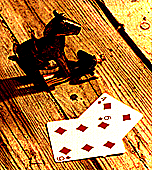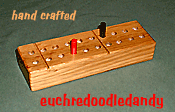the publishers of The Columbus Book of Euchre


 Informational pages
Informational pages 

 Shareware
SharewareHardware


 Stone idiots
Stone idiots 

 New
NewEuchre as we knew it once was popular on line, on various world wide web sites such as Pogo (form-
erly Excite), Yahoo!, Hardwood, Mystic Island and Games.com.

 The newest kid on the block, and perhaps the best, is a site called Trickster. There’s also a lot of software out there for solitary euchre masturbation, including
some shareware listed below.
The newest kid on the block, and perhaps the best, is a site called Trickster. There’s also a lot of software out there for solitary euchre masturbation, including
some shareware listed below.Once upon a time, you could play euchre (and other card games) on line, with and against other human beings, for free, and without a “download.” The premier sites were Yahoo! and Pogo. No more. Yahoo! began having conflicts with JAVA early in 2014, and it closed its game sites down in March with a promise of a “newer technology platform” to come. Not yet, and we despair of seeing a user-friendly Yahoo! site again. Pogo also is a site of the past.
Not only is Pogo unoperational, but also it became so corrupted by “TRAM” that it became nearly useless. “TRAM” is an acronm for “The rest are mine” and will sweep the board, without showing you the rest of the cards when the outcome of the hand has been determined. Yes, we realize that “Chris’s trick” (look it up in the book: The fifth trick when the trick count is already 3 to 1) is meaningless, but a card player wants to know who had the 9 of hearts, or the unplayed left bower, when the hand is over. Players on line have become so addicted to “speed” (you are more likely to get “booted” from a game for playing slow than for cussing out other players) that they adopt the “TRAM” option without thinking.

Horse on rider (get him off!)

No horse, no rider, no sitting be-
tween the markers, no elbows,
with a euchredoodledandy!
